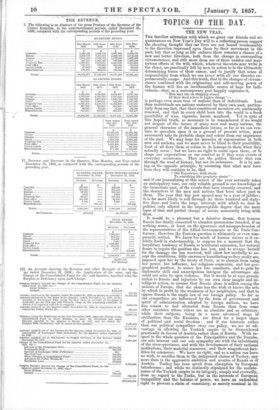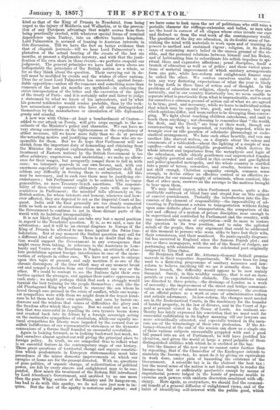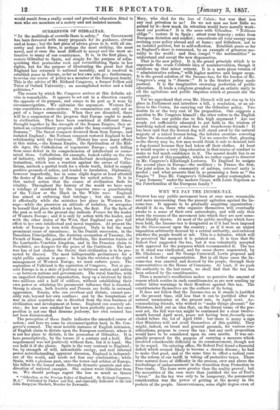TOPICS OF THE DAY.
THE NEW YEAR.
nu familiar salutation with which we greet our friends and acquaintances on New Year's Day will to a reflecting person suggest the cheering thought that our lives are not bound irredeemably to the direction impressed upon them by their movement in the past, but that so long as life endures there remains a chance of a new and better direction, both from the change in surrounding circumstances, and still more from one of those sudden and mysterious efforts of the will, which, whatever theorists may write in the closet, are practically felt by men in action to be the ultimately determining forces of their career, and to justify that sense of responsibility from which we can never with all our theories experimentally escape. And this truth, that in the changes of circumstance combined with the originating and self-moving power of the human will lies an inexhaustible source of hope for individuals-that, as a contemporary. poet happily expresses it, "Men may rise on stepping-stones
Of their dead selves to higher things "
is perhaps even more true of nations than of individuals. Less than individuals are nations enslaved by their own past, particularly from one fad, that their constituent members are continually renewed, and that in every child born into the world is a fresh possibility of wise, vigorous, heroic manhood. Yet in spite of this hopeful truth, so necessary to be remembered if we would not despair of the future of many men and many nations, the general character of the immediate future so far as we can venture to speculate upon it as a ground of present action, must necessarily take its probable shape and colour from our experience of the past. We may hope for miracles of regeneration in both men and nations, and we must never be blind to their possibility, least of all deny them or refuse to do homage to them when they actually occur ; but we have no right to count upon them, or to shape our expectations or our conduct as if they were events of everyday occurrence. They are the golden threads that run through the woof of history, but not its substance. It is by aeting on the opposite principle, by assuming that what men have been they will continue to be, that "Old Experience doth attain
To something like prophetic strain" :
and if our journalizing at this season of the year naturally takes an anticipatory tone, our only reliable ground is our knowledge of the immediate past, of the events that have recently occurred, and the characters of the men and nations that have taken part in them. The year that has just opened may be a year of jubilee ; it is far more likely to roll through its three hundred and sixtyfive days and leave the large interests with which we deal in politics only altered in the imperceptible degree that the mere lapse of time and partial change of actors necessarily bring with them.
It would be a pleasant but a delusive dream, that because Russia has finally consented to abandon pretensions founded, if on nothing worse, at least on the ignorance and misapprehension of the representatives of the Allied Governments at the Paris Conference, therefore the Eastern question is ultimately or even temporarily settled. We know too much of human nature as it exhibits itself in statesmanship, to suppose for a moment that the hereditary tendency of Russia to territorial extension, her natural desire to regain the position she has lost, and to avenge herself for the damage she has received, will allow her cordially to accept the conditions little onerous or humiliating as they really are, imposed upon her lity the treaty of Paris, or to abstain from using her power, her in uence, her religious connexion, and her geographical position, to annoy her late assailants, and to gain by diplomatic skill and unscrupulous intrigue the advantages she could not seize by open violence. But it would be at once grossly unfair to Russia and injurious to our own clear insight and intelligent action, to assume that Russia alone is selfish among the nations of Europe, that she alone has the wish or knows the arts by which to profit by the weakness of her neighbours, and that to oppose Russia is the single law of our foreign policy. So far as our sympathies are influenced by the form of government and spirit of administration adopted by foreign nations, we have less reason to feel alienated from Russia than from some other countries whose rulers are as absolute and as arbitrary, while their subjects, being in a more advanced stage of civilization than the Russians, are fitted for a larger share of political and social freedom : and if our interests rather than our political sympathies sway our policy, we see no advantage in allowing the Turkish empire to be dismembered praetically in favour of Austria rather than of Russia. With respect to the whole question of the Principalities and the Danube, our sole interest and our sole sympathy are with the inhabitants of the river-provinces, and with the development of their national institutions, their material resources, and their magnificent facilities for commerce. We have no right, and as a nation can have no wish, to sacrifice them to the antiquated claims of Turke3r, any more than to the aggressive ambition and avarice of Russia or of Austria. Turkey has been saved from absorption by European interference ; and while we distinctly stipulated for the maintenance of the Turkish empire in its integrity, simply and avowedly, from no regard to the Turks, but in the interests of European tranquillity and the balance of power, we have an undoubted right to prevent a claim of suzerainty, as merely nominal ill its
kind as that of the King of Prussia to Neuehitel, from being urged to the injury of Moldavia and Wallachia, or to the prevention of any European advantage that might accrue from their being practically erected, with whatever special forma of nominal dependence upon Turkey, into an effective barrier kingdom. Lord Palmerston is accused of leaning to Austrian interests in this discussion. Till we have the fact on better evidence than that of cliquish journals—till we hear Lord Palmerston's explanation of the actual bearing of the events of the last six months, at present a diplomatic mystery, and with that the justification of his own share in those events—we perforce suspend our judgment. The general principles we have laid down above are indisputably the principles of the British nation as a whole, so far as they think about the question. Their carrying out in detail must be modified by events and the wishes of other nations. Thus far at least Lord Palmerston has succeeded, against formidable opposition—unless all the rumours and something more than rumours of the last six months are mythical—in enforcing the strict interpretation of the letter and the execution of the spirit of the treaty of Paris : and it is certainly safer and fairer to judge a statesman by what we know of his antecedents, and by what his general tendencies would render probable, than by the reckless accusations of opponents who have all along distinguished themselves by the manufacture or circulation of idle diplomatic gossip and scandal. A new war with China—at least a bombardment of Canton— added to our attack on Persia, will give scope enough to the assailants of the Minister's policy and character. We can have no very strong convictions on the righteousness or the expediency of either measure, till we know more fully than we do at present the otetuating motive and justifying reasons of those who are responsible for them. But we do hope that Parliament will not shrink from the important duty of demanding and obtaining from the Minister the amplest explanations on both subjects. The treatment of Eastern nations by the British Government is too often arbitrary, ungenerous, and unchristian : we make no allowance for their usages, but arrogantly compel them to fall in with ours ; we interpret quarrels in our own favour, and, with our enormous superiority of mechanical force and military skill, find seldom any difficulty in forcing them to submission. All this may be necessary, and in each case there may be justifying circumstances; but Parliament ought to be content with no vague generalities, no mere Treasury-bench assertions. The responsibility of these violent courses ultimately rests with our representatives in Parliament ; the mischief falls ultimately on the British nation, for whose interests and honour, wherever and however affected, they are deputed to act as the Imperial Court of Inquest. India and the East generally are too closely connected with us both as men of conscience and as men of business to allow the Government to continue to act in those distant parts of the world with its habitual irresponsibility.
It is not likely that England can take any but a moral position in regard to the Neuchatel question. It is, as we said, a case for arbitration ; and it will be an eternal disgrace to Europe if the King of Prussia be allowed to use force against the Swiss Confederation. But at any moment the Italian question may call for a different kind of interference. There is no doubt that the nation would support the Government in any consequence that might ensue from taking, in reference to the Austrians in Lombardy and Venice or the Bourbons in Naples, an attitude of absolute prohibition against foreign interference in case of the insurrection of subjects in either ease. We have not space to enlarge upon this topic at present, and only mention it as one of the chronic distempers of the time which may at any moment break out and compel a decision from our Government one way or the other. We could be content to see the Italians fight their own battles against the stranger, and against their native oppressors in each state ; we might perhaps think that such a struggle would furnish the best training for the people themselves ; and, like the old Plantaganet King who refused to succour the son whom he loved though sore pressed in the crisis of conflict, while our warmest sympathies were with them we might deem it the truest kindness to let them test their own qualities, and earn by heroic endeavour and the wisdom that comes of difficulties the glory and the freedom after which they aspire. But we could not see a nation that was successful in expelling its own tyrants borne down and crushed back into its fetters by a foreign sovereign acting on the instinctive sympathies of absolutism, while our equally natural sympathies for liberty were impeded by the coward fear or selfish indifference of our representative statesmen or the dynastic connexions of a throne itself founded on successful revolution.
Again in looking forward, as in looking backward last week, we find ourselves almost against our will giving the principal place to foreign policy. In truth, we are compelled thus to reflect what is an essential feature in the contemporary stage of our history. These great questions of territorial change and organic constitution which predominate in European statesmanship must take precedence of the minor domestic improvements on which our energies at home are for the present directed. With us, questions of pure politics, of organic change, of redistribution of political power, are felt by every sincere and enlightened man to be suspended. How much the treatment of the Reform Bill introduced by Lord Aberdeen's Government, and snubbed by no one more than the pure Whig section of the Ministry and its hangers-on, has had to do with this apathy, we do not care just now to inquire. But the fact of the apathy is notorious and patent; and we have come to look upon the set of politicians who still raise a periodic clamour for suffrage-extension and, ballot, as men who are the least in earnest of all cliques whose cries invade our ears and distract us from the real work of the contemporary world. The questions of the day are education, in its double sense of furnishing the mind with materials to work upon and of training its lowers to method and sustained rigour; religion, in its double sense of sustaining man's belief in the unseen ground of the visible, and the personal relations between himself and his Maker, and of habituating him to subordinate his selfish impulses tospiritual ideas and expansive affections ; penal discipline, itself a branch of education as well as of police ; and those varied questions of material improvement of which sanitary arrangements
form one pole, while law-reform and enlightened finance may called the other. We confess ourselves unable to enter tain any very flattering expectations of what the year is likely to bring forth in these lines of action and of thought. In the problems of education and religion, closely connected as they are naturally, and in our country historically too, we seem unable to separate what is practicable from what is impracticable, and to erect for ourselves a common ground of action out of what we are agreed to be true, good, and necessary, while we leave to individual action that which may be equally true, good, and necessary, but upon which opinions differ, and seem rather to be diverging than converging. We fight about teaching children catechisms, and omit to teach them anything ; not choosing to remember that "the world, the flesh, and the Devil," are busy at their work, though our counteracting work is suspended, or terribly impeded, while we wrangle over an idle question of scholastic phraseology or ecclesiastical arrangement. We hate each other heartily, and vex one another like starved wolves, on a dispute about the colour and ornaments of a tablecloth—about the lighting of a couple of wax candles—about an unintelligible proposition which derives its whole interest and importance from the metaphysic and logic, of the schoolmen, while elderly gentlemen and unprotected females arc nightly garotted and robbed in this crowded and gas-lighted and police-guarded metropolis, and the whole country is startled into a panic of terror, cowardice, and cruelty, because we have not skill enough, Christian sympathy enough, common sense enough, to devise either an effective control or an effective reformation for our annual supply of criminals, whose conduct, like that of other men, answers on the average to the motives brought to bear upon them. We may indeed expect, when Parliament meets, quite a discreditable outbreak of blind fury and stupid fear on this subject of convict-punishment. Probably the introduction into the discussion of the element of responsibility—the impossibility of advocating in Parliament a return to transportation without fixing upon some definite place of transportation, the comparison of the cost and efficacy of a system of prison discipline near enough to be supervised and controlled by Parliament and the country, with any conceivable system of exportation—will do more to restore the question to its true position, and to calm the agitated minds of the people, than any argument that could be addressed at this moment to persons who seem alike to have lost their wits, their consciences, and their manhood. No panic equally disgraceful has occurred in England since the famous Popish plot ; and two or three newspapers, with the aid of the Bench of Judges, are performing with admirable success the celebrated part originally assigned to Titus Oates.
Sir Benjamin Hall and Mr. Attorney-General Bethel promise marvels in their respective departments. We have been too long used to a flattering programme of sanitary measures and lawreform to believe anything till we see it actually done. In the former branch, the difficulty would appear to be now mainly financial. Surely, in this wealthy country, that is not an insuperable or even a formidable obstacle. `The expectations raised are directed to three points,—the drainage of London as a work of necessity; the improvement of the street and bridge communication as a matter of almost necessary convenience ; the erection of an official palace as a work at once of administrative reform and artistic adornment. In law-reform, the changes most needed are in the Ecclesiastical Courts, in the machinery for the transfer of landed property, in the law of divorce, and in the Court of Appeal at present vested in the House of Lords. An eminent authority has lately expressed his conviction that we must wait for successful codification in its higher meaning till our lawyers are more scientifically educated, and especially trained in the accurate use of the terminology of their own profession. If the Attorney-General at the end of the session can show us a single one of these various subjects successfully grappled with and a _good bill passed into an act of Parliament, he will have justified his elevation, and given the world at large a proof palpable of those distinguished abilities with which he is credited at the bar.
Into the finance of the new year we cannot enter further than•
by repeating, that if the Chancellor of the Exchequer intends to maintain the Income-tax, he must do it by giving an equivalent in work done, under pain of hazarding the existence of the Government. A scientific tax is in the abstract the best tax ; but the moral sense of the nation is not high enough to render the Income-tax fair or sufficiently productive except by means of
inquisitorial powers lodged in the hands of persons unable to exercise such powers with uniform discretion combined with effi
ciency. Here again, as everywhere, we should feel the eoonomical benefit of a general diffusion of enlightened views, and of the habit of identifying self-interest with the public good, which
would result from a really sound and practical education fitted to men who are members of a society and not isolated monads.


































 Previous page
Previous page